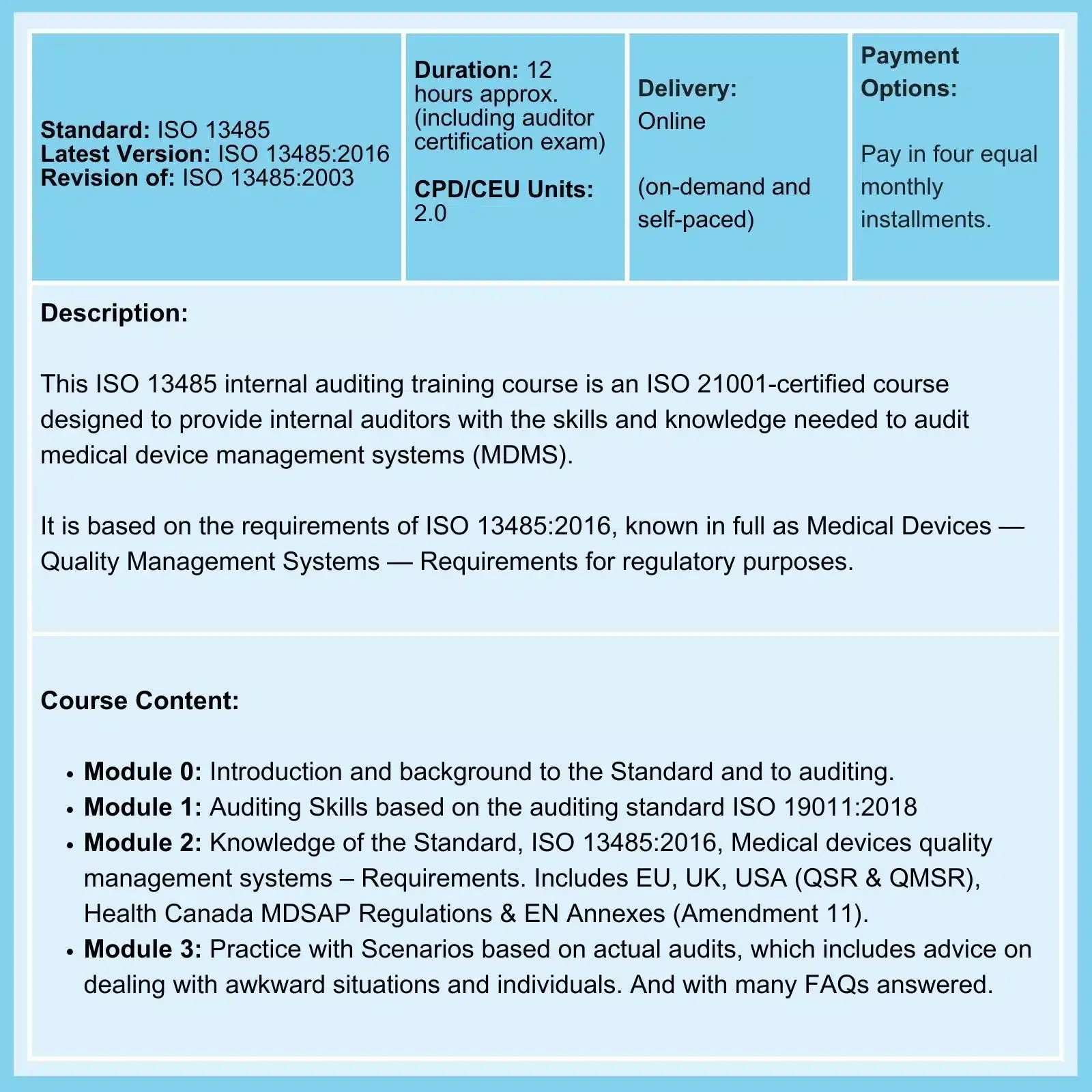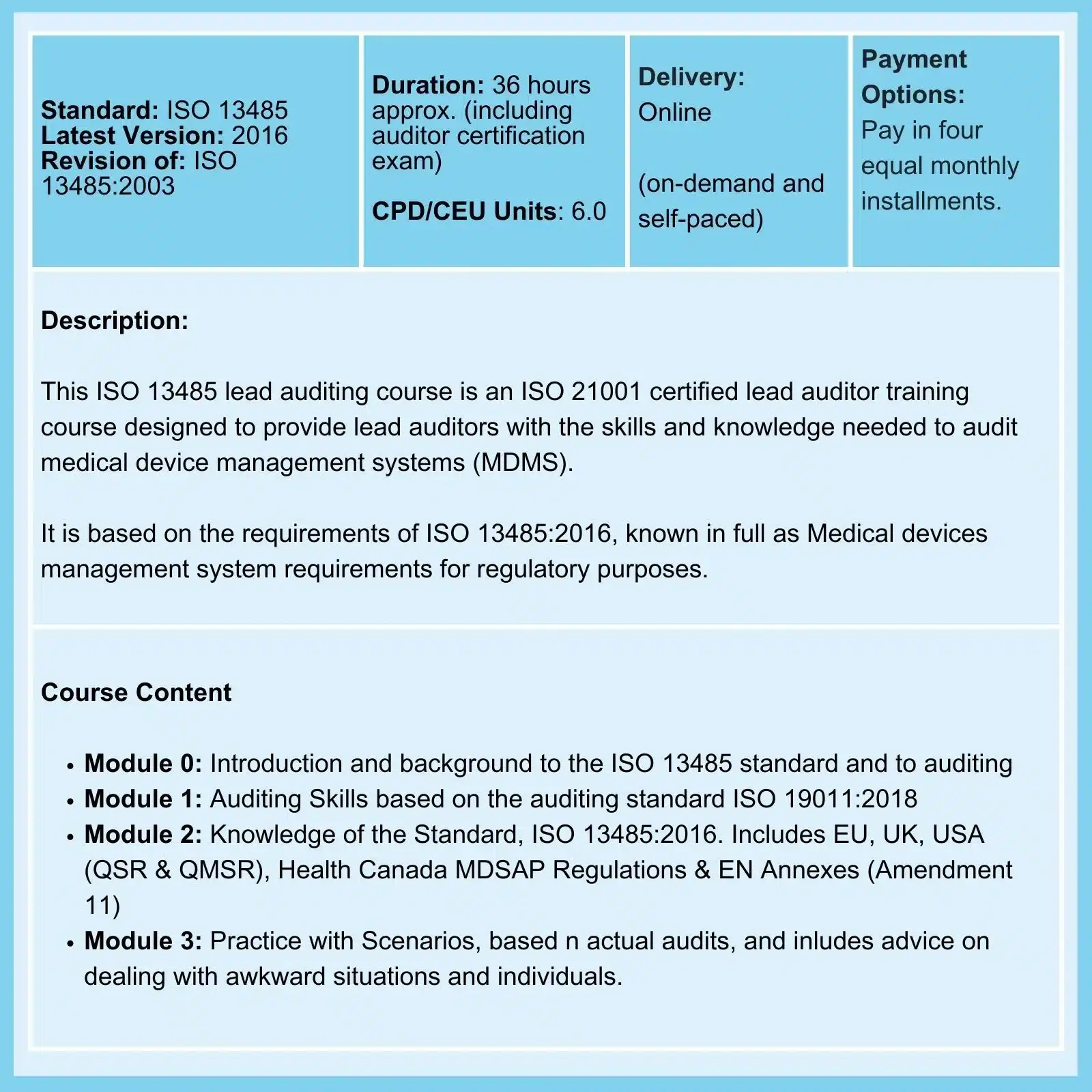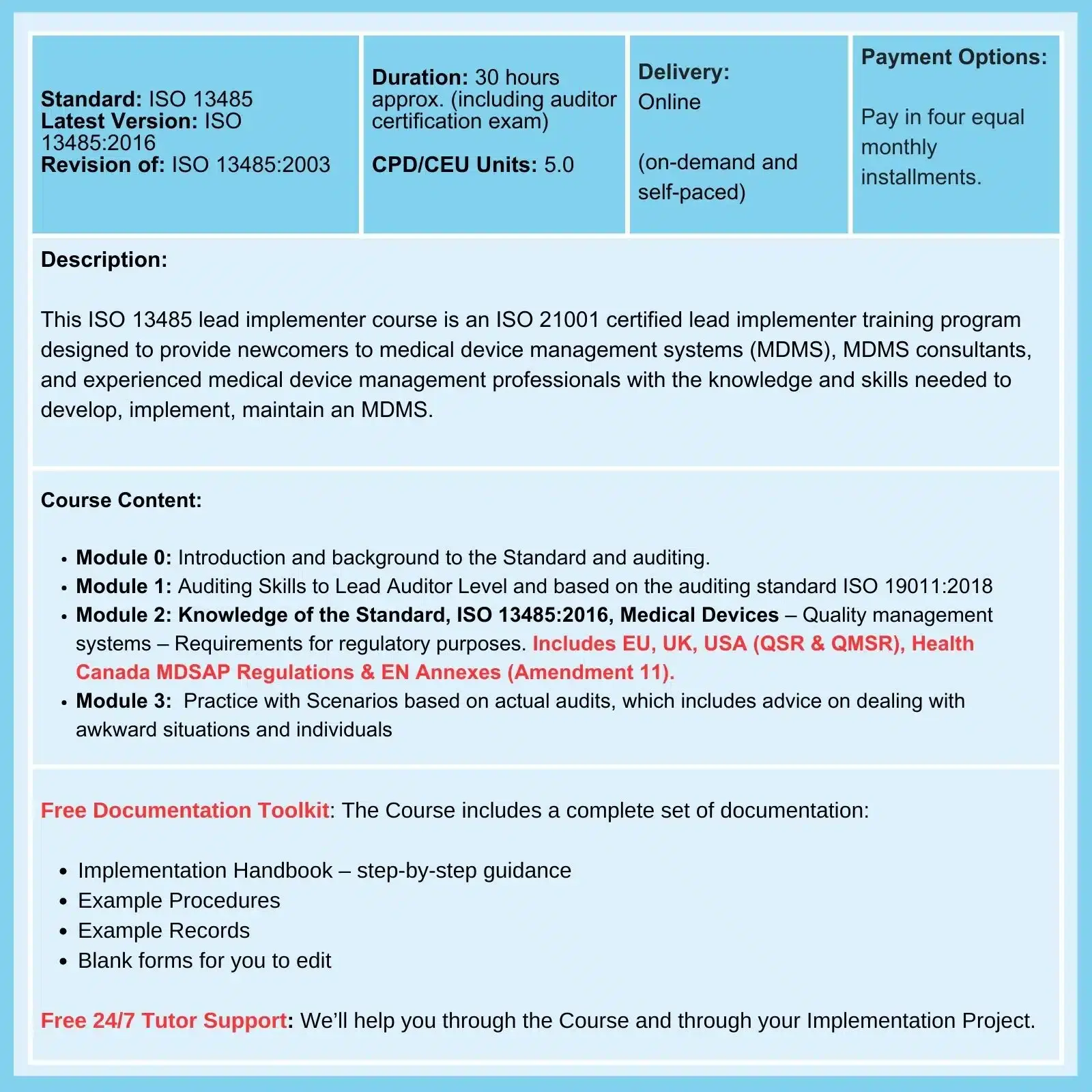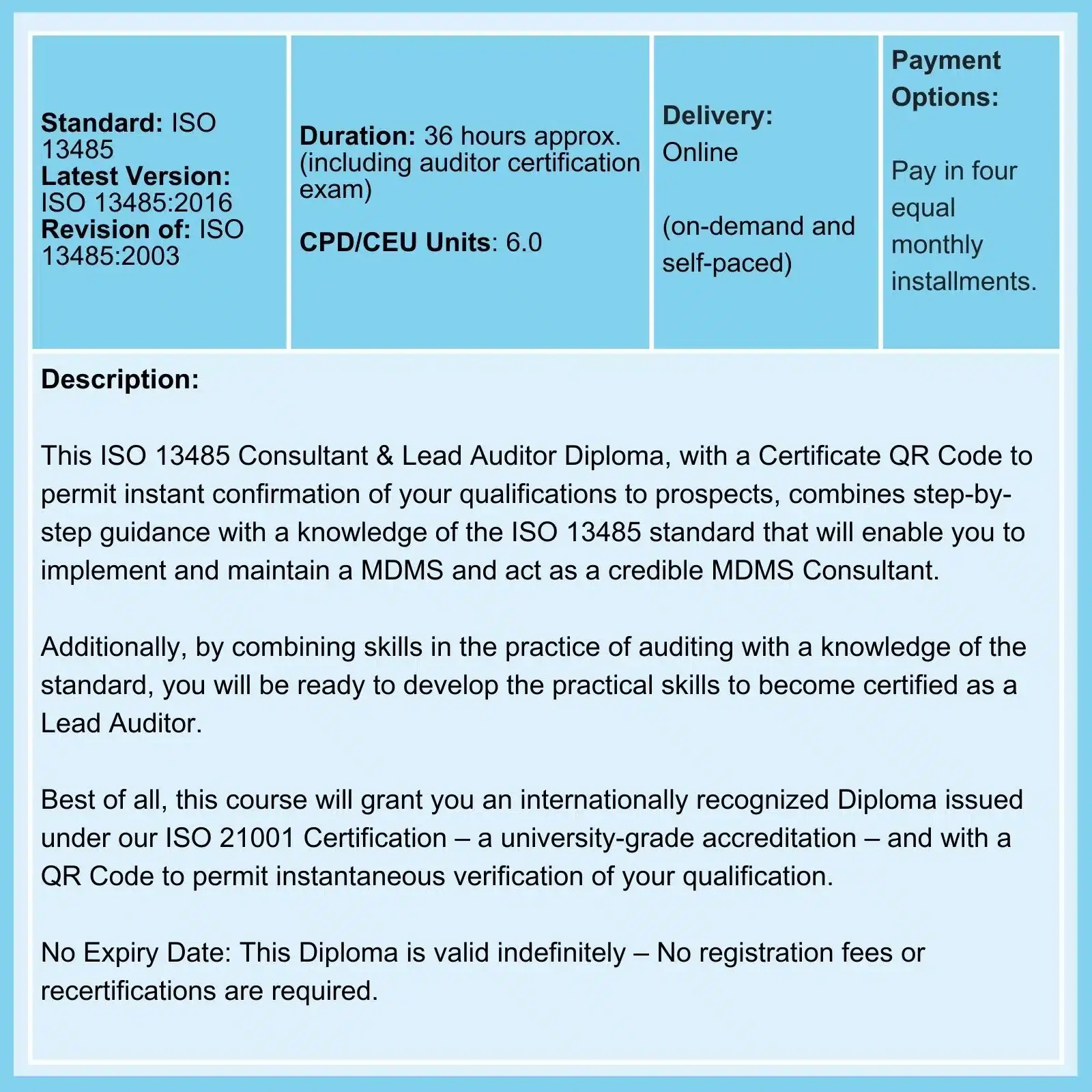
If your company supplies components or materials to an EU medical device manufacturer, here is the information you need to be aware of, as outlined in the ISO 13485 Regulations. And it's about unannounced audits of your business by Notified Bodies.
Table of Contents
- Sample Audit Scenario
- What is the Purpose of Unannounced Visits
- What are Notified Bodies?
- What are Mandatory Regulations Related to Notified Bodies?
- How Frequent are Unannounced Audits?
- What are Critical Subcontractors and Crucial Suppliers?
- Who Pays for Unannounced Audits?
- Who May Become Subject to Unannounced Audits?
- What about Contractual Agreements and Proprietary Processes?
- What do Unannounced Audits Check?
-
Recommended Actions if You are Considered a Critical Subcontractor or Crucial Supplier
Sample Audit Scenario
During a recent ISO 13485 Certification Audit, the Auditee, a supplier of molded parts for a medical device manufacturer, was surprised to discover that her premises could be subject to Unannounced Audits by a Notified Body. When asked what she would do if such an Audit Team came to the door, she said that they would be asked to leave. And that could have created a major regulatory problem for the customer, a major multinational (and a vital customer).
Could your business face a similar situation?
What is the Purpose of Unannounced Visits?
In 2013, the European Commission published a Recommendation (2013/473/EU) regarding assessments and audits to be performed by Notified Bodies in the medical device field. The purpose of the unannounced audits is to ensure day-to-day compliance of the manufacturer's product and quality management systems.
Note: Under medical device regulations, the "manufacturer" refers to the organization that places the product on the market and, consequently, is the holder of the Marketing Authorization. Suppliers to manufacturers are designated as 'Critical Subcontractors' and 'Crucial Suppliers', as appropriate.
A key aspect of this Recommendation is the mandatory requirement for unannounced audits of all manufacturers certified under one of the European medical device regulations (MDR or IVDR) at least once every three years.
What are Notified Bodies?
A Notified Body is a third-party organization assigned by member countries of the European Union (EU) to evaluate if products conform to expected standards before they are released in the market.
What are Mandatory Regulations Related to Notified Bodies?
In 2014, various European regulatory authorities, including the Medicines and Healthcare products Regulatory Agency (MHRA) in the UK (then still part of the European Union) and the Health Products Regulatory Authority (HPRA) in Ireland, among others, required Notified Bodies to fully implement their unannounced audit programs. It is interesting to note, in passing, how a Regulatory Authority can convert a Recommendation, which by definition is non-mandatory, into a mandatory requirement.
And the situation has not changed since the introduction of the revised medical device regulations, MDR and IVDR, in 2017.
NOTE: Following Brexit, the MHRA and former UK-based Notified Bodies are no longer subject to EU Regulations. But equivalent UK Regulations for unannounced visits apply.
How Frequent are Unannounced Audits?
Unannounced audits must be performed at least once every three years, last at least a whole day, and should be conducted by a team of at least two auditors. They may take place on the premises of the manufacturer, of critical subcontractors, or of crucial suppliers.
What are Critical Subcontractors and Crucial Suppliers?
The European Commission Recommendation specifies that a critical subcontractor or a crucial supplier must be audited if this is likely to ensure more efficient control… in particular, if the main part of the design development, manufacturing, testing or another crucial process is located with the subcontractor or supplier" (c"lause 2, point c and Annex III, point 2). The official definition of "critical supplier" provided by the Notified Bodies Operations Group (NBOG) Guidelines for Notified Bodies auditing suppliers to medical device manufacturers (BOG 2010- 1).
2.2 Critical supplier
A critical supplier is a supplier delivering materials, components, or services that may influence the safety and performance of the device.
Note: In the context of auditing medical device manufacturers, a critical supplier is a supplier of a product or service whose failure to meet specified requirements could pose an unreasonable risk to the patient, clinic, or other, or could result in a significant degradation in performance. This can include suppliers of services, which are needed for compliance with QMS or regulatory requirements, e.g., internal audit contractors or Authorised Representatives.
The usual interpretation is to consider that...
- A critical subcontractor ensures all or part of the MD's design, or performs all or part of the manufacturing processes, or carries out all or part of an activity in relation to regulatory requirements (e.g., post-market data collection), and
- A crucial supplier provides finished devices or key subassemblies essential to the performance of the MD or critical raw materials.
The manufacturer must provide the Notified Body with a list of critical subcontractors and crucial suppliers, as specified in their risk management system. This list is reviewed during the planned audits of the certification cycle. There is no regulatory requirement for critical subcontractors and crucial suppliers to be informed of their inclusion on such a list.
Who Pays for Unannounced Audits?
The European Commission Recommendation states that the costs associated with unannounced audits are paid for by the manufacturer, including the audits performed on the premises of its critical subcontractors/crucial suppliers. If the manufacturer refuses to pay, the contract between the Notified Body and the manufacturer may be potentially breached, resulting in the suspension or even withdrawal of certificates.
Notified Bodies have established processes and procedures for managing and controlling unannounced audits, as well as training relevant staff. This adds to the costs of the conformity assessment, and manufacturers should factor these additional costs into their budgets.
Who may become subject to Unannounced Audits?
Examples of candidates for unannounced audits include:
- Original Equipment Manufacturers (OEM)
- Suppliers or subcontractors involved in the design and development of medical devices or software development
- Suppliers or subcontractors providing processes that require validation, such as sterilization, sterile packaging, and virus inactivation
- Suppliers or subcontractors providing critical raw materials that are not fully verified by receiving inspection and testing, e.g., component or raw material for an implant, animal tissue materials
And samples may be taken during an unannounced audit at the supplier's premises. The EU Recommendation requires performing tests at the premises of critical subcontractors or crucial suppliers. Such samples may only be taken at the supplier's with the manufacturer's consent.
What about Contractual Agreements and Proprietary Processes?
Many suppliers have proprietary processes and systems in place. Without a direct relationship (including a Confidentiality Agreement) established between a Notified Body and a firm's supplier, how do Notified Bodies plan on conducting unannounced audits of proprietary processes? The unannounced auditing of critical suppliers has to be ensured by the legal manufacturer in supply contracts with the supplier.
And, if the supplier does not allow the auditor to observe all the processes used for manufacturing the product certified by the Notified Body, the audit team will document this in their audit report and recommend to the certification board the suspension of the certification.
What do Unannounced Audits check?
Mandatory elements to be audited in all unannounced audits include:
- Conformity of the selected device with the technical documentation and with legal requirements,
- Traceability of all critical components and materials,
- Traceability system,
- Conformity of manufacturing activity was ongoing at the time of the unannounced audit with legal requirements, and
- Conformity of the manufacturer's documentation relevant to the manufacturing activity with legal requirements.
Although the company is not notified by the Notified Body of the planning of an unannounced audit beforehand, the methodology is identical to that of an announced audit within the certification cycle.
At the end of the audit, any non-conformities found will be presented to the company. The testing of any samples identified during the audit, as well as their transportation to the testing location, is the responsibility of the manufacturer.
Recommended Actions if you are considered a Critical Subcontractor or Crucial Supplier
If your company is, or is intending to become, a supplier to a medical device manufacturer, we suggest:
- Review or establish in your Supplier Contract whether your company is listed as a critical subcontractor or a crucial supplier in the documentation submitted to the Notified Body. Ensure that there is an obligation to inform you of any changes to your status on such a list.
- Ask your customer to share their risk assessment information about the product and/or services you provide.
- Develop a protocol or procedure for handling an unannounced audit.
- Train relevant staff on the protocol and procedure.
- Conduct a simulated unannounced visit (with your consultant as the auditor, perhaps) to provide staff with practice in the protocol or procedure and to ensure that your arrangements are robust.
Related Courses
Related Articles
- ISO 13485 Certification: 26 FAQs Answered
- ISO 13485 to be a Requirement in Medical Device Regulations
- ISO 13485: Critical Subcontractors & Crucial Suppliers
- ISO 13485: What Medical Device Suppliers Need to Know
deGRANDSON Global is an ISO Certified Educational Organization
In October 2021, we secured certification to three education-related ISO Standards. We now have a university-grade management system in place that conforms to the requirements of …
We have chosen ISO 21001 certification because, unlike IRCA and Exemplar badges (which, in our opinion, are commercially compromised), it is based on an independent third-party assessment. It is a university-grade standard in use globally by schools, colleges, and universities to demonstrate their competence.
We are accredited providers of Courses on ISO 9001, ISO 13485, ISO 14001, ISO 17025, ISO 27001, ISO 45001, Data Protection, Risk Management, and more.
Written by Dr John FitzGerald
Related Articles…
On 02-Feb-26, the FDA Final Rule, amending the Current Good Manufacturing Practice (cGMP) requirement of the Quality System Regulation (QSR) of medical device manufacture, comes into force. The amendments incorporate by reference (and so align more closely with) the international standard ISO 13485:2016, Medical Devices - Quality ... Continue reading
Your old ISO 9001 QMS 'dolled up' with the language of the 2016 Standard is not going to be adequate. When you are first audited against ISO 13485:2016, the Auditors, whether a Notified Body or Certification Body, will, as usual, be seeking objective evidence of your compliance with the Standard. Being an audit against ISO 13485, a ... Continue reading




